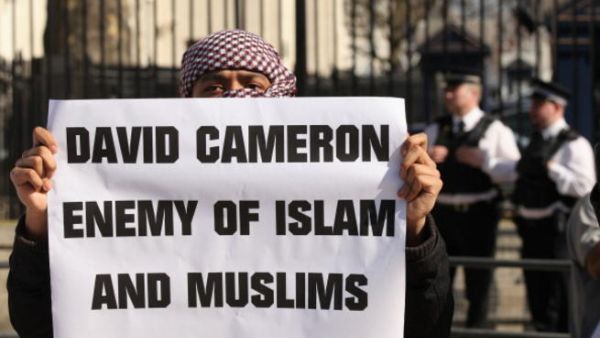UK officials on Monday prompted calls for deporting a man with links to al-Qaeda back to his home country of Jordan.
The man in question is Abu Qatada, a man once described by a European judge as Osama Bin Laden’s right hand.
Qatada was stripped of his refugee status and imprisoned in 2005 in England without being prosecuted for any criminal or conspiracy offenses and then released on bail in February 2012. Qatada, who is also known as Omar Othman, is prohibited from using a mobile phone or computer and subjected to an electronically monitored 22-hour curfew that only allows him to leave home twice a day for a maximum of one hour each.
Successive governments in the UK have insisted that Qatada cannot be deported to Jordan, claiming that it would breach his human rights. But measures taken by Italy and France, which violate the European Court of Human Rights in Strasbourg, are increasingly compelling Britain to follow suit.
On Monday, Strasbourg admitted it is effectively powerless in intervening in the case of the Tunisia-born convicted terrorist, Mohamed Mannai, who was deported from Italy.
The Strasbourg court ordered that compensation be paid to Mannai, who was sent home to Tunisia in 2010 in breach of a court order, since they are unable to force Italy to take him back.
“Once the applicant has been deported there is nothing much we can do because he is in Tunisia, a country that is not part of the European Court of Human Rights,” a spokesman said.
Italy also ignored a court ruling in June 2008 and sent convicted terrorist Ben Khemais back to his home country in Tunisia.
In 2010, France deported the Egyptian Ali Ibrahim al-Soudany, a radical Muslim cleric for his religious extremism and inciting followers to rise against the West.
A dilemma in the UK
A conservative member of British parliament, Dominic Raab, urged Britain to send Qatada back to Jordan immediately, citing Italy and France as examples of deporting people despite Strasbourg’s order disallowing them from doing so.
“In the Qatada case, Strasbourg went well beyond existing human rights law. Having bent over backwards to accommodate this flawed ruling, we now need to put him on a flight to Jordan without delay,” The Daily Mail quoted Raab as saying on Tuesday.
UK’s Home Secretary Theresa May is currently negotiating with the Jordanian government to get assurances that Qatada would be given a fair trial. Last week, May refused five times in an interview to say whether she would defy Strasbourg judges and force the deportation of Qatada.
She insisted to find a way to deport Qatada so the government would not “not [be] required by any court” to take him back.
A British conservative politician, David Mellor, said May should simply ignore the ruling in Strasbourg because he could stand trial for terrorism offences including evidence gathered through torture.
Some however believe that he was not prosecuted in Britain because of the embarrassment it may have caused to the security services over evidence, or lack thereof.
Qatada is under a worldwide embargo by the United Nations Security Council Committee 1267 for his alleged links to al-Qaeda.
Legal problems?
With terrorist incidents becoming more of an occurrence in Europe, a set of legal problems has also risen.
Recently, one saw French gunman of Algerian descent, Mohammed Merah, shot Jewish children, a rabbi and paratroopers in the southern city of Toulouse. While French authorities could not verify that his act was done on the instruction of al-Qaeda, some analysts believe that al-Qaeda’s new strategy is, in fact, to stop acting like a network.
Merah’s incident created a dilemma for European security authorities who said that apprehending suspicious individuals with no clear connections to terrorist networks is legally problematic.
Europol chief Rob Wainwright told The Associated Press that there are limits to what law enforcement officials can do.
Echoing his concern, Alain Chouet, a former intelligence director at France’s DGSE spy agency, said “we have one law for war, one law for peace, but we don’t have a law for the current situation.”
“If we stopped (Merah) three weeks ago, what would people have said? ‘Why are you stopping him? What did he do?’”
By Dina al-Shibeeb
Is Abu Qatada a true to threat to the UK's well-being? Should it take greater measures to get read if extreme influences?








